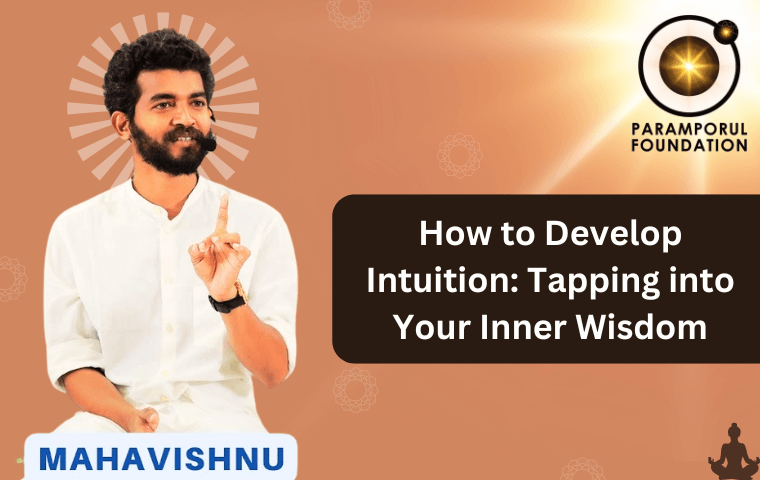In our fast-paced world, we often rely on logic and reasoning to navigate our daily lives. While these tools are important, there’s another powerful guide that often goes unnoticed; our intuition. Intuition is that subtle inner voice or gut feeling that guides us, helping us make choices that are true to who we are. But how do we learn to trust and develop this inner wisdom? Let’s explore some simple and practical steps to develop your intuition and unlock its full potential.
Understanding Intuition
Intuition is often seen as an inner knowing that doesn’t rely on conscious reasoning. It’s the feeling you get when something just “feels right” or when you sense a warning without any logical explanation. This inner wisdom comes from a combination of our subconscious mind processing past experiences, emotions, and subtle cues from the environment. Intuition isn’t just a mystical concept; it’s a natural ability that everyone possesses and can develop with practice.

Why We Struggle to Connect with Our Intuition
Many of us find it challenging to connect with our intuition because we have learned to prioritize logic and reason over our inner feelings. From a young age, we are taught to listen to authority figures, follow rules, and make decisions based on external expectations. This can lead to a disconnection from our inner voice, making it harder to trust our gut feelings.
Moreover, past experiences, especially those involving criticism or neglect, can create self-doubt and make us wary of trusting our intuition. But the good news is that with a little practice, we can reconnect with this powerful inner guide.
How to Develop Intuition
Developing your intuition requires patience, practice, and a willingness to listen to that quiet inner voice. Here are some steps to help you strengthen your intuitive abilities:
Practice Mindfulness and Meditation
One of the most effective ways to tune into your intuition is through mindfulness and meditation. By quieting the mind, you create space for your inner wisdom to emerge. Take a few minutes each day to meditate, concentrating on your breath and releasing any distracting thoughts. Over time, you’ll find that your mind becomes more receptive to subtle intuitive signals.

Keep a Journal
Pen down your thoughts, feelings, and experiences, which will help you notice patterns and insights that you might not see otherwise. Start a daily journal where you record any intuitive feelings or “aha” moments. Review your entries regularly to see how your intuition has guided you in the past.

Pay Attention to Your Body
Your body is a powerful tool for developing intuition. Notice how your body reacts in different situations, whether it’s a feeling of tension, butterflies in your stomach, or a sense of calm. These physical sensations can be valuable clues from your intuition, signaling whether you’re on the right path.
Engage in Creative Activities
Creativity and intuition are closely linked. Activities like painting, writing, or playing music allow you to bypass logical thinking and tap into your subconscious mind. When you engage in creative practices, you create a space where intuition can flourish.

Practice Listening to Your Inner Voice
Begin by asking yourself simple questions and listening for the answers that arise naturally. It might be as simple as deciding what to eat for dinner or choosing the best route to work. The more you practice listening to your inner voice, the stronger it will become.

Trust Your Gut Feelings
When faced with a decision, take a moment to check in with your gut feelings. What is your initial reaction? Does it feel right or wrong? Trust these instincts, even if they don’t make logical sense at the moment. The more you trust your intuition, the more confident you’ll become in its guidance.
Spend Time in Nature
Nature has a calming effect that can help quiet the mind and open you up to intuitive insights. Take regular walks in natural settings, away from the noise and distractions of daily life. Use this time to reflect, breathe deeply, and connect with your inner self.

Understand Your Dreams
Our dreams often carry important messages from our subconscious mind. Place a dream journal next to your bed and jot down any dreams you recall as soon as you wake up. Think about the symbols and feelings in your dreams, and see how they might connect to your daily life.

Try Visualization Techniques
Visualization exercises can help you strengthen your intuitive abilities by sharpening the images and symbols in your mind. Imagine yourself in different scenarios and pay attention to the feelings and insights that arise. Visualization can help you connect with your intuition and bring clarity to different areas of your life.
Surround Yourself with Supportive People
Spend time with people who encourage you to trust and develop your intuition. Engaging in conversations with others who value intuitive insights can help reinforce your own trust in your inner wisdom.

The Benefits of Developing Intuition
By strengthening your intuition, you gain a helpful tool that can guide you through life’s challenges with more confidence and clarity. Intuition helps you make decisions that match your true values, improves your relationships, and deepens your connection with yourself. Over time, as you become more attuned to your inner wisdom, you’ll find that life flows more smoothly, and you approach challenges with a sense of ease and grace.
Conclusion
Developing intuition is a journey of self-discovery that requires practice, patience, and trust. Including these simple practices in your daily routine may help you reconnect with your inner wisdom and guide you toward living a more fulfilling and authentic life. Remember, your intuition is always there, waiting to be heard, so take the time to listen and let it lead the way.

